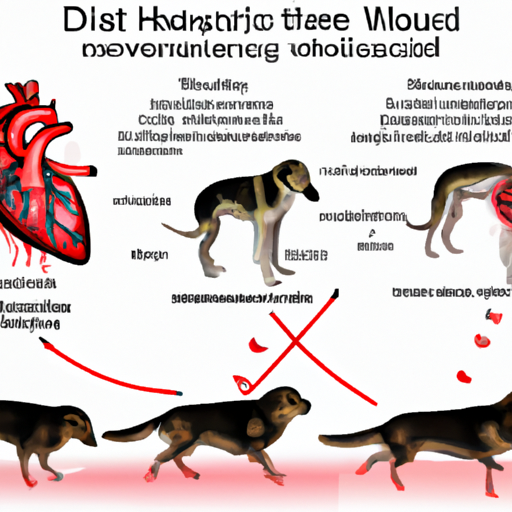As a dedicated caregiver, understanding the risks that heartworm poses to your beloved pet is crucial. This guide will shine a light on the insidious nature of this parasite, and arm you with the knowledge to keep your canine companion safe.
H2: Understanding Heartworm Disease in Dogs
Heartworm disease, caused by the parasite Dirofilaria immitis, is a severe and potentially fatal condition that primarily affects the heart, lungs, and associated blood vessels of dogs. It is transmitted through the bite of an infected mosquito, making every dog—regardless of breed, age, or indoor/outdoor lifestyle—vulnerable to the disease.
H2: The Life Cycle of a Heartworm
The heartworm lifecycle is complex. Here’s a simplified sequence:
- An infected mosquito bites your dog, transmitting heartworm larvae.
- Over approximately six months, these larvae mature into adult heartworms.
- These adults reproduce, releasing new larvae (microfilariae) into your dog’s bloodstream.
H2: The Effects of Heartworm on Your Dog’s Health
The effects of heartworm disease can be devastating. Here’s what happens:
- Heart Damage: Heartworms reside in the right side of the heart and nearby blood vessels, causing damage and inflammation.
- Lung Disease: As heartworms multiply, they can invade and obstruct the lungs, leading to respiratory distress.
- Organ Failure: If left untreated, heartworm disease can lead to organ failure and death.
| Symptoms | Possible Indication |
|---|---|
| Coughing | Heartworm-associated respiratory disease |
| Lethargy | General sickness |
| Fainting | Heart failure |
| Weight Loss | Severe disease |
H2: Preventing Heartworm Disease
Prevention is your best defense against heartworm disease.
- Regular Check-ups: Regular veterinary check-ups and heartworm tests are essential to catching any potential infection early.
- Heartworm Preventatives: Veterinarians can prescribe monthly preventatives that kill heartworm larvae before they mature into adults.
H2: Treating Heartworm Disease in Dogs
If your dog contracts heartworm disease, treatment is possible but can be challenging and expensive. It typically involves:
- Stabilizing your dog’s condition.
- Administering medication to kill adult heartworms.
- Ongoing treatment to kill microfilariae in the bloodstream.
FAQs
Q: How long does it take for heartworms to mature?
A: It takes about six months for heartworms to mature.
Q: Can humans get heartworms from their dogs?
A: No, humans cannot contract heartworms from their dogs.
Q: Can indoor dogs get heartworms?
A: Yes, mosquitoes can get inside homes, so indoor dogs can get heartworms.
Q: What happens if heartworm disease goes untreated?
A: Untreated heartworm disease can lead to severe organ damage, heart failure, and death.
Q: Is heartworm disease more prevalent in certain parts of the country?
A: Yes, heartworm disease is more common in areas with large mosquito populations, such as the Southeastern United States.
As you navigate the world of pet ownership, remember: knowledge is power. Understanding heartworm disease and its effects on dogs is a crucial step in safeguarding their health and happiness.



